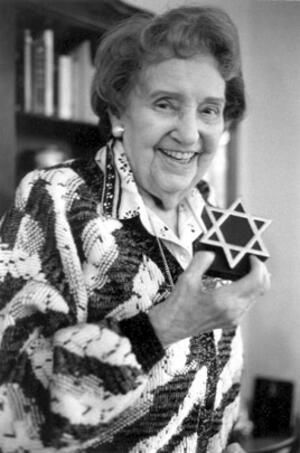Ann Meyers Kaplan
Ann Meyers Kaplan’s family moved to Seattle from New York City in 1910 when Ann was three. Her father opened a tailoring business in Pioneer Square. For Ann’s parents and many Russian émigrés like them, the Settlement House and the socialist-leaning Workmen’s Circle were centers of Jewish community life. A graduate of Garfield High School, Ann worked as a bookkeeper in Seattle, later moving to San Francisco. She returned to Seattle after eloping with Ben Kaplan in 1935, who wooed her long-distance for three years. For the next 50 years, Ann served as bookkeeper in his company. After their daughter lost her hearing at age three, Ann devoted much of her time to seeking experimental treatments, advocating for the hearing impaired, and raising a second child, a son.
Ann discusses her family life and childhood, her parents' backgrounds, and her early life in Seattle. She attended cheder and Garfield High School and had ambitions beyond marriage. For Ann's parents and many Russian émigrés like them, the Settlement House and the socialist-leaning Workmen's Circle were centers of Jewish community life. Her first job was as a bookkeeper in Seattle and San Francisco. Ann became involved in the National Council of Jewish Women, attended their 1929 convention in San Francisco, and started a Seattle Section Evening Group. Ann worked at two Seattle-area department stores, Frederick & Nelson and The Bon Marche, both popular with Jewish clientele. Ann was reluctant to get married but met her husband Ben at a dance at Herzl synagogue, and they later eloped. During World War II, Ann gave up her work at a hospital to work as a bookkeeper with her husband's roofing business while she was pregnant with their first child. Ann's first child, Maxine, contracted mumps at three years old and lost her hearing as a result. Ann tried desperately to find treatment for her and became an advocate for the hearing impaired. Ann reflects on her Jewish identity, community involvement, disability rights activism, leadership positions, and female friendships over the years. She fondly remembers her job at the Bon Marche wig department, family vacations, and various leisure activities. Other topics include Sephardic/Ashkenazic relations, the Settlement movement, the National Council of Jewish Women, feminism, health, and aging.



